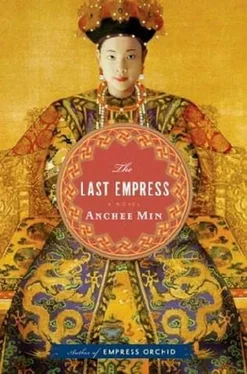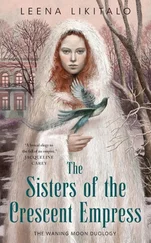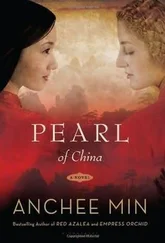Everything Alute did told me that she was spoiled and had no idea of the consequences of her actions. Instead of taking part in her husband's mourning, she spent her days with senior court members, my opponents.
If Alute left me with a choice, I would be able to show her the way. But she couldn't conceive that transferring power would involve contending political factions at court and in the government nationwide. She didn't believe there could be a struggle. Alute let me know that she didn't desire my help and that her distrust of me was solid and final.
How could an innocent girl who didn't know me hate me so much? I was more puzzled than upset. Although Alute was Nuharoo's pick, I didn't think Nuharoo was aware of the depth of Alute's hatred.
I feared this girl Alute, and I worried for my grandchild. The fact that Alute had considered taking her unborn's life scared me. What would she do to China if she were given total power?
I wrote back to Alute after she rebuffed my proposal for a sensible solution between us: "The ministers, governors and commanders in chief of China would not be willing to serve unless their ruler proved to be worthy of their devotion and lives. It would not be as easy as attending a dinner party, doing embroidery or watching an opera."
Alute answered me with her suicide.
She left the court an open letter, which she might not have written alone. The language was vague and her metaphor obscure.
"When a bird is dying, its song is sad," Alute began. "When a lady is dying, her words are kind. This is the condition in which I find myself today. Once went a girl to her death, and she could not walk erect. A bystander said to her, 'Are you afraid?' She replied, 'I am.' 'If you are afraid, why not turn back?' The girl replied, 'My fear is a private weakness, but my death is a public duty.'"
Did Alute believe that she had a duty to die? I saw it as nothing but a protest and a punishment against me. I had not only lost Tung Chih but his unborn child. No enemy could destroy me more.
Alute's maid said that her mistress was pleased with the decision to end her life. Alute treated the suicide as an event to celebrate. She awarded the servants with money and keepsakes for helping her. The servants were called to witness the suicide act. Alute declared that anyone who dared to disrupt her would be whipped to death. When the morning of the set date arrived, Alute dosed herself with opium and then dressed herself in an eternal robe. The servants were then dismissed. Alute shut herself in her bedroom, and by afternoon she was dead.
The opium Alute took was smuggled into the Forbidden City by her father, who had learned of his daughter's plan. Although he was against it, as a patrician loyalist who had been given a high royal title upon his daughter's marriage, he complied with her wish. He feared that her misbehavior would cost him his own good life. After he had supplied Alute with enough opium to kill her, he wrote to the court that he had nothing to do with his daughter's action.
I summoned the father and asked him if he had said anything to upset Alute. The man replied, "I told her to stop grating on Your Majesty's nerves."
I felt sorry for Alute, for she had received no support from her family. More than that, I resented her for killing my unborn grandchild. Then it dawned on me that I had never received confirmation of Alute's pregnancy from any doctor, nor had I seen her belly swell.
Doctor Sun Pao-tien came at my summons. He reported that an examination had never taken place, because Alute had never granted his entrance.
Was it possible that all was staged?
If the pregnancy was false, Alute's suicide would make more sense. She would have ended up being one of scores of Tung Chih's backyard ladies. She would not have been given the role of regent, since she was childless. By accompanying Tung Chih to his grave, she achieved virtue and would be honored. In the meantime, her letter placed the responsibility for her death squarely on me.
Beneath Alute's shy manners was a strong and willful mind, an unquiet character with a monstrous ambition.
My opponents made good use of Alute. It disgusted me to look at her father, who appeared to be harmless. I couldn't forgive a man who would encourage his daughter to kill herself. If this was how Alute was raised, it might be fortunate that she didn't have a child.
In Alute's imagination I had posed a great threat. She might have fantasized about her life as regent, and I was the only obstacle she needed to overcome. The way Alute worded her letter sounded confident. The fact that she had no doubt she was carrying a male child was in itself evidence of a mental disorder.
Grandchild or no grandchild, the possibility would continue to haunt me. What saddened me was that the death of her husband had aroused no sympathy in Alute. If she had truly loved Tung Chih, she wouldn't have murdered his child.
It hurt me to think of the possibility that my son was cheated out of his only love. The thought led me to other possibilities, such as the reasons behind Tung Chih's addiction to whores. Was it because he was denied affection? Tung Chih was no angel, but he was a child who had always been hungry for love.
I tried to stop my thoughts from dwelling on guilt. I told myself that Tung Chih and Alute were once true lovers and that should count and continue to count.
Before spring, an official accused me of "precipitating the Emperor's relapse." I paid no attention to this; the idea was ridiculous. What I didn't expect was that the story made its rounds and was picked up and published by a respected English journal. It made me the center of an international scandal-the prime suspect of Emperor Tung Chih's "murder."
"The loving Alute was visiting Tung Chih on his sickbed," the article read. "She complained about her mother-in-law's interfering and domineering ways, and she was happily looking forward to the day Tung Chih would be well again. It was at that moment the raging Dowager Empress Lady Yehonala entered. She rampaged through the room, seizing Alute by the hair and hitting her while Tung Chih suffered a terrible nervous crisis, which caused the fever to return and eventually to kill him."
I dreamed of ice floating on a lake in the midst of its melting, thin and fragile. The ice didn't look like ice but pieces of rice paper. Tung Chih had no idea what southern China's winter looked or felt like. He was used to the solid ice of Peking winters. He was never allowed to skate on the frozen palace lake; instead he watched his cousins play all day long. The most Tung Chih was allowed was to tie straw strings around his shoes so that he could walk on the ice with the help of his eunuchs.
In my childhood memory, winter was always cold and damp. When the northwest wind blew strong against the windows and made the panes rattle as though someone were knocking, Mother would announce that the coldest part of winter had arrived. Because the temperature never really dropped below freezing in the south, few of the houses had heaters.
I remember Mother taking out all of our winter clothes from cases made of sandalwood. We put on thick cotton jackets, hats and scarves, and everyone smelled of sandalwood. When it was cold in the house, people went out into the street to warm themselves under the sun. Unfortunately, most southern winters were sunless. The air was damp and the color of the sky remained gray until the season passed.
Today I woke in a well-heated room. Li Lien-ying was so grateful when I didn't push away my breakfast that he was almost in tears. He served me a southern-style meal: hot porridge with preserved tofu, root vegetables and peanuts, with roasted seaweed and sesame seeds. He told me that I had been ill and had slept around the clock.
Читать дальше












